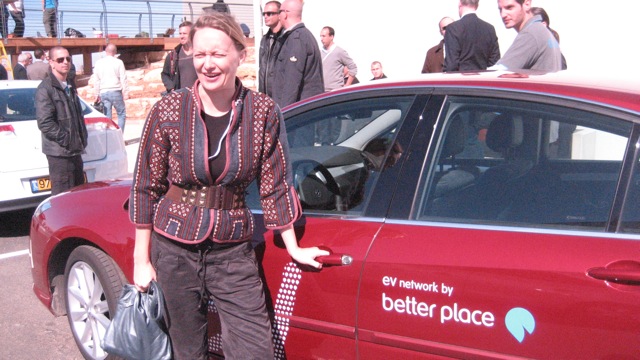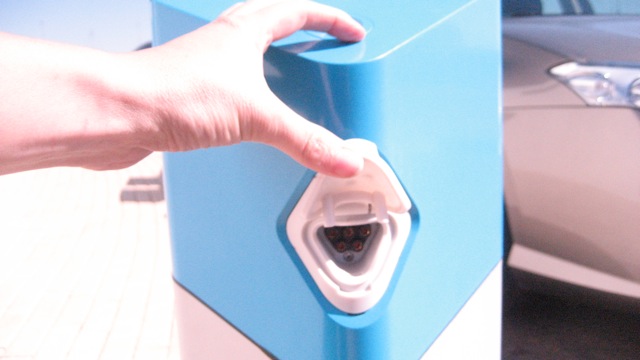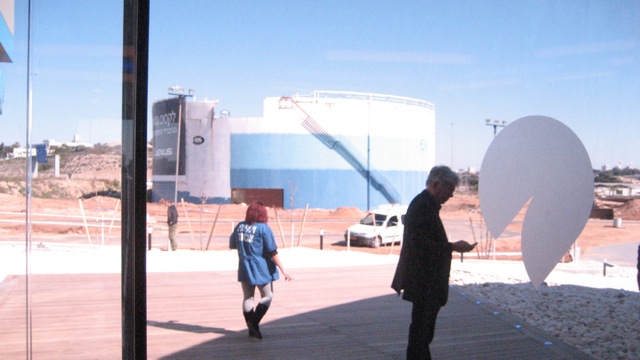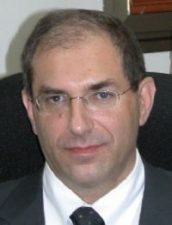 Karin attends Better Place press conference as company launches its electric car testing facility for the public, in Israel. The sun’s in her eyes as she clutches the door of the new Renault Nissan car. Or maybe she’s blinded by all the excitement?
Karin attends Better Place press conference as company launches its electric car testing facility for the public, in Israel. The sun’s in her eyes as she clutches the door of the new Renault Nissan car. Or maybe she’s blinded by all the excitement?
The media gathered outside the old oil storage containers –– a remnant of the past that line highway #2 on the way from Tel Aviv to Herzylia. The news we were interested in hearing about was not about Better Place’s $350 investment earlier in January, but about the roll out of the Better Place electric education facility that invites the public to test-drive the electric car. We wanted to know when this company will make its vehicles available to the public and on what terms.
Shai Agassi, the CEO of Better Place, a man of rock star status known for propelling the idea to mainstream investors all over the world was there, as were representatives from Renault-Nissan and investor types from HSBC and other firms. I’ve never seen more black suits in one room in my life.
The Israeli press (those not wearing the black suits) were there as were reporters from the international community including CNN, NBC and Bloomberg, but the people asking the tough questions were the Israeli press like Haaretz very contrarian at times, and which wasn’t sold on the Better Place package.
Israel is still relying on coal power. How can the Better Place electric car help wean the country off oil?
 Shai Agassi swamped by international press at education facility opening.
Shai Agassi swamped by international press at education facility opening.
What the people have been being told all along is that the Better Place model, which would sell kilometers instead of a car would be much cheaper than a gas-fueled car. It turns out that the cost will probably be about the same, possibly a bit less than a gas car.
According to Haaretz:
Employees of Better Place and of the Renault car fitted with batteries explicitly forbid us to look under the hood or in the trunk. Secrecy is important when it comes to nascent technology, they explained, and before it can be fully revealed there are still a few international patent forms to fill out.
The issue of price is also cloaked in fog: According to Better Place Chief Technology Officer Barak Hershkovitz, “At the end of the day the costs will be similar to that of a gasoline-powered car, or less.” Significantly reducing the cost to consumers, he said, is the fact that Better Place will pick up the tab for the lithium batteries – estimated to cost about $10,000 – as part of the customer service plan.
But I found Shai Agassi handled the negative comments adeptly. He retorted to the fact that Israel uses coal as a source of energy as not something his company can solve. That Better Place is doing its part by reducing air pollution in cities; it’s also made a commitment to buy back the same amount of electricity from renewable energy sources that its car plan uses. “We aim to be a zero carbon footprint company,” says Agassi.
One reporter was concerned about the summer blackouts when the Israeli grid reaches its peak and cuts off in half hour increments to deal with the shortage. If anything, explained Agassi, the Better Place charging stations with cars around the country hooked into the grid can store an excess of energy when it’s there in off hours (like in the middle of the night) and return it to the system when there is a peak. Using software that will charge time of the car to off hours, “most cars will charged ahead of time,” said Agassi.
Another reporter was concerned about the batteries and how recyclable they will be. Agassi says that the lithium-ion/phosphate battery will be fully recyclable and 80% of the material recoverable for future batteries.
An Italian reporter didn’t understand how it could work in Europe, being such a large community, how could Better Place outfit batteries to serve a need of driving between communities and countries. Agassi says that Europe is a much bigger collection of “islands” than Israel, and in fact a more ideal place for the car network to be in place, with switching stations put in place between islands.
Agassi praised Renault-Nissan for investing 12-15% of their R&D budget in this new technology.
According to Agassi the Better Place symbol will become an international brand of Israel, like the Jaffa Orange. And thanks to this new test driving center, the first of its kind, Israel will roll out its trial run later in 2010 with 5 to 10 battery switch stations, and a few thousand charging stations (at home, at work and at shopping centers), with a few hundred cars on the road.
 Want to know what the Better Place recharge station looks like up close?
Want to know what the Better Place recharge station looks like up close?
By 2011 it will deploy 70-100 switch stations, and by the beginning of its full scale commercial launch later that year expect a roll out of about 1,000 cars on the road per month.
Better Place already has agreements in place with 92 Israel companies including Netvision, Strauss and Motorolla who have committed to changing their fleets (totaling 45,000 cars) to the Better Place model.
“Opening the Better Place center, it’s not just about changing a car, but a change in perception,” says Agassi. “That’s what’s happening here. We will allow every citizen of Israel to experience driving the electric car.”
 Out of a massive oil container, like the one in the background, Better Place fashions its education facility, replete with auditorium seats made from gas-guzzling cars.
Out of a massive oil container, like the one in the background, Better Place fashions its education facility, replete with auditorium seats made from gas-guzzling cars.
The public in Israel might just buy it. Now with the Toyota Prius’ tainted image over the recall, and still a long wait for the Chevy Volt expected to become available next year around the same time as Better Place, the only other great option seems to be the Ford Fusion hybrid (with a brake glitch?). For those waiting for the full electric experience, a year is probably not that long to wait.
Speaking of waiting – I didn’t stand in the long line to test the Better Place car but expect a report from GP sometime in the near future. But me and Stacy from Solveclimate did arrive in style: in a Car2Go pay as you go car, which she rented in Tel Aviv.



Toyota & Honda dropped the ball on handling the recalls , they should have came forward with a full disclosure. Instead of waiting for a huge media blitz and tons of public pressure. But Toyota & Honda are not alone , I never seen so many car companies having recalls all at the same time. I had no idea my car which is not even a Toyota or Honda, was affected until I searched on http://www.carpedalrecall.com and found I had a bad Anti Lock control unit on my 2008 Pontiac G8 , So be careful check daily, it seems more and more cars are being recalled .
I don't know how hot it gets in Israel, but any electric car used in hot climates better have a real battery cooling system and high temperature motors. Charging or discharging batteries under high temperatures severely reduces battery life and capacity.